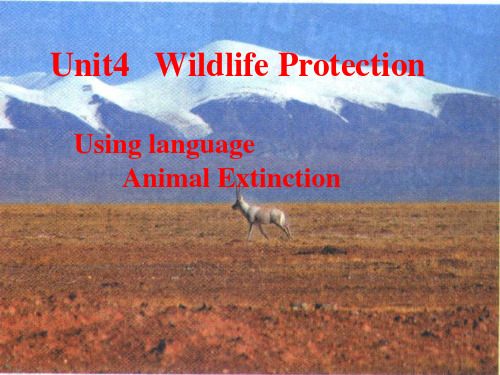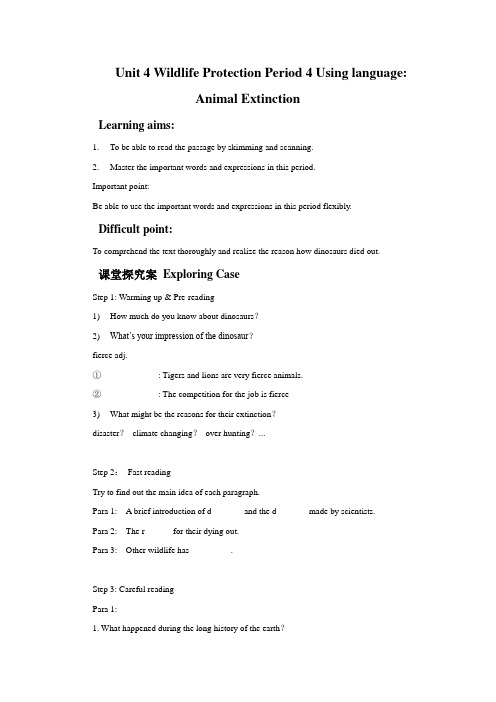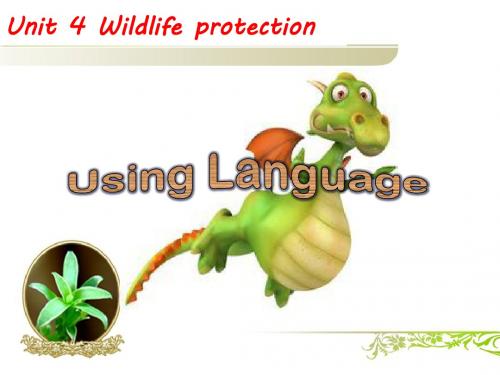必修二 Unit4 Using language Animal extinction(reading &listening)
- 格式:ppt
- 大小:4.05 MB
- 文档页数:23



Unit 4 Wildlife protection----Using Language 教学设计课时:Unit4 Wildlife protection---- Using Language科目:高中英语教学对象:高一年级学生课时:1课时45分钟教学版本:人教版必修二教材分析:Unit4 Wildlife Protection出自人教版必修2,本单元是关于野生动物的保护。
主要内容有Warming up-wildlife, Reading-How Daisy learn to help animals, Using language等三部分组成,主要围绕“野生动物保护”这个话题,培养学生保护野生动物的意识。
在Warming up部分,学生已经了解到一些野生动物的词汇,在Reading 这部分,通过Daisy与几种野生动物的对话,学生也对一些野生动物濒临灭绝的原因和保护野生动物的措施有了一定的了解.在Using language 部分,让学生通过学习恐龙的灭绝,建立起一种保护野生动物的意识,也复习了前面的词汇。
综上所述,本单元旨在通过学习野生动物保护,培养学生热爱自然,保护野生动物的意识。
学习者分析:学习者是普通中学的高一学生,虽然通过前面的warming up 和reading 的学习,对本单元的话题有了一定的了解,但由于基础薄弱,词汇的掌握有限,授课者在课程设计的过程中,设计的问题难度要适中,必要的时候要适当地提供一些词汇上的帮助,运用自主学习的方法和团队协作学习的方法,降低学习的难度,调动学生的学习积极性,活跃课堂的气氛。
教学目标:1.知识目标:(1)通过学习,学生能够朗读词汇:come into being,according to,long before,too...to....,die out,for sure,in the last 500years(2)学生能够结合自己的生活经历和感悟,使用下列词汇造句,表达自己的看法:I’m going to … , I intend / mean / plan to… I will …,I feel like … I’d like to …, I’ m ready to …(3)学生掌握写信的格式2.技能目标:学生通过反思野生动物濒危和灭绝的原因,结合自己的生活经验和经历,发表自己对野生动物保护的看法,参与讨论,口头陈述3.情感目标:通过学习和讨论,了解保护野生动物的方法,树立保护野生动物的意识教学重难点:1.利用所学的词汇去表达自己的看法2.修正语法错误教学策略和方法:任务型教学和小组合作学习教学辅助:1.学生导学案 2.PPT电子演示文稿3.多媒体设备4.白板和笔Teaching procedure。


Unit 4 Wildlife Protection Period 4 Using language:Animal ExtinctionLearning aims:1. To be able to read the passage by skimming and scanning.2. Master the important words and expressions in this period.Important point:Be able to use the important words and expressions in this period flexibly.Difficult point:To comprehend the text thoroughly and realize the reason how dinosaurs died out.课堂探究案Exploring CaseStep 1: Warming up & Pre-reading1) How much do you know about dinosaurs?2) What’s your impression of the dinosaur?fierce adj.①_____________: Tigers and lions are very fierce animals.②_____________: The competition for the job is fierce3) What might be the reasons for their extinction?disaster?climate changing?over hunting?...Step 2:Fast readingTry to find out the main idea of each paragraph.Para 1: A brief introduction of d_______ and the d_______ made by scientists.Para 2: The r______ for their dying out.Para 3: Other wildlife has _________.Step 3: Careful readingPara 1:1. What happened during the long history of the earth?2. When did dinosaurs live on the earth?3. What did scientists discover?Para 2:What might be the reasons for their dying out?Para 3:1. According to the UN report,what can we know?2. What do we know about the dodo?Step 4: Language Points1. They lived on the earth tens of millions of years ago,long before humans cameinto being. 千百万年前,早在人类产生之前,它们就生活在地球上。

Unit4 ANIMAL EXTINCTION一.课文感悟与探究:Many animals 1. ____________ ( disappear) during 2. ______________(这段漫长时期)of the earth. The most famous of these animals are 3. ________ (恐龙). They lived on the earth 4. ___________ (千百万)of years ago, long before humans 5.____________ (形成) and their future 6. _______________________ (在另0 时看起来很安全).There were 7. ______________________ (许多不同种类的)dinosaur and a number of them 8. _______ (曾经)live in China. The eggs of twenty-five species have been found in Xixia, County, Nanyang, Henan Province. 9. ____________ (不久前)a rare new species of 10. _______________ (形状像鸟一样的恐龙)was11. ______ (discover) in Chaoyang County, Liaoning Province. When scientists12. _______ (观察)the bones, they 13. ___________ (surprise) to find that these dinosaurs could not only run like the others but also climb trees• They learned this from 14. ______________________________ .(恐龙骨骼的连接方式).Dinosaurs 15. ______ (灭绝)suddenly about 65 million years ago. Some scientists think it came after an 16. __________________ (意夕卜事故)when 17. ____________________________________ (宇宙间一块巨石击屮地球因而在空气中扬起大量尘土)・Others think ]& __________________________________ (地球变得太热,因此恐龙无法在地球上生活了).Nobody knows 19. _____ (确切地)why and how dinosaurs disappeared from the earth 20. __________________ (在这么短的时间里).We know many other wild plants, animals, insects and birds have died out more recently.21._____________________ (根据)a UN report, some 844 animals and plants22._____________ (disappear) in the last 500 years. The dodo is one of them. It lived on the Island of Mauritius and was a very friendly animal. Please listen to a story of the dodo and how it disappeared from the earth.二•阅读理解ALittle did I know that the boy I knew in middle school was depressed (抑郁的). Never did it occur to me that he had just missed the knock of death.It all happened before a biology class, when my friend sitting next to me asked if I knew what had happened to Jack the night before. I said no. She then pulled up her Facebook page in her mobile phone, and showed me Jack,s post: he stole his brother^ car and crashed (撞)it against the wall on the highway一on purpose.In America, whatever is posted on Facebook is for everyone to talk about, and today's topic, of course, was about Jack. To me, however, I felt a responsibility to achieve. As an editor of my high schooPs newspaper, I thought it was my duty to cover what had happened. I would use this power to spread the awareness of depression (抑郁症).I began to write my article. I researched into depression. I collected real life stories. At first I was afraid that it would be difficult to interview the students who were suffering from depression, but they reached out to me, and gave me in-depth answers. They described how bad they might feel and what they would suddenly feel like doing一however terrible it could be.I also managed to speak to Jack. It was a bit embarrassing at the beginning, because the air around seemed to be still. Finally, I cut through the silence by asking directly: "How did this all start?^^While writing the article, I was serious- The stories and the feelings I had learned from my schoolmates were too much to me. However, I knew this article was going to change lives.1.What did Jack do the night before the writer knew it?A.He was caught stealing a car.B. He almost killed himself.C. He put on a live show on Facebook.D. He suddenly fell seriously ilk2.What responsibility did the writer feel?A.To raise public awareness of depression.B.To run a special newspaper on depression.C.To find better treatments for depression.D.To use his power to spread more happiness.3.The writer did a lot to achieve his responsibility EXCEPT _____ .A.doing careful research into the illnessB. telling people how to cure the illnessC. collecting real life stories from sufferersD. writing an article about the illnessBOrganic (有机的)foods have had a pretty good rise in popularity over the course of the last decade. And it seems that in the near future the trend will steadily continue. From 2004 to 2014, American organic food production increased by 240%. Natural and organic sales reached $81.3 billion in 2014, up 13.5% from the year before.It seems like everywhere you go, you see organic products. However, is this trend actually a good thing? Are the benefits of organic foods grounded in scientific fact?The sign "Organic"is given to products by the United States Department of Agriculture (USDA). The foods with the sign have to maintain a certain standard of production. For example, the food should not be grown or raised using any pesticides (杀虫齐ll)or fertilizers (化I]巴).Probably the major reason why people are encouraged to buy organic foods is that they are told: “Organic foods are better for you.”But is this really the case?According to some studies, although organic foods have higher levels of vitamin C and minerals (矿物质),the differences are little ― these may have no influence on the overall nutrition (营养).Besides, there's really very limited information on actual health outcomes with eating these products. Comparing organic foods and those produced in traditional ways, we don't know enough to say which is better than the other.But these studies have not provided any final say on either of them. If anything,it's only added fuel to the heated debate over whether organic products are really worthy of their popularity and prices.4.What's the trend discussed in the article?anic foods are getting more and more welcomed.anic foods are winning popularity in most countries.C.Foods produced in traditional ways are dying away.D.The ways of producing foods will be more scientific.5.WhaFs true about organic foods according to some studies?anic foods only sound healthie匚B.People get healthier by eating organic foods.C.They are different in outcomes from other foods.D.They have the highest levels of overall nutrition.6.What can we know from the last paragraph?A.The studies lead to more discussions about organic foods.B.The studies provide clear advice on what food to choose.anic foods dorf t deserve such popularity and prices.anic foods will lose ground to other kinds of food.7.What is the articled attitude towards organic foods?A. Unsure.B. Supportive.C. Negative.D. Unconcerned.三.完形填空Are you left-handed? If you are, you make up just 10 percent of the world's population. This —11— that we live in a right-handed world. Most people write or play musical instruments with their _12_ hands.Why are so few people left-handed? A new theory, called "cooperation (合作)VS competition9', may have the answer. As humans evolved (进化),we needed to —13— together to live. When tools are _14_ for a right-handed person 一like a knife 一it was easier if everybody could use them with the _15_ hand. But some humans wanted to compete instead. So to have an advantage over right-handed people, they would use their left hands to _16— the right-handed competitors.Although there are far _17_ left-handed people than right handed ones, some of them are geniuses. German born American scientist Albert Einstein, British physicist Isaac Newton and British biologist Charles Darwin are some of the most _18_ “lefties". At least five former US presidents were left-handed, and now Barack Obama is, too.“Lefties” are also often _19— with creativity and visual (视觉)skills. How can this be? Well, the left side of our brain is where we solve problems. The right side of our brain is where we _20_ creativity. Right-handers —21_ to use the left side of the brain more than the right side. Yet left-handers tend to use _22_ sides more evenly(均衡地)than right-handers.That is why there are more left-handers in creative areas, such as music, _23_ and writing・ However, it9s not all _24_ news for left-handers. They tend to have worse memories, often _25_ names and places.11.A. means B. warns C. predicts D. supposes12. A. certain B. right C.good D. green13. A. talk B. hear C. work D. walk14. A. bought B. cleaned C. made D. taken15. A. same B. different C. wrong D. left16. A. challenge B. amuse C. help D.choose17. A. greater B. fewer C. smarter D. happier18. A. scientific B. beautiful C. advanced D. famous19. A. bored B. related C. discussed D. disliked20. A. hide B. develop C. need D. grow21. A. demand B. ask C.hope D. tend22. A. both B. neither C. same D. other23. A. reading B. politics C. arts D. calculation24. A. recent B. old C.good D. sad25. A. forgetting B. repeating C. sharing D. deciding第一节单词拼写。